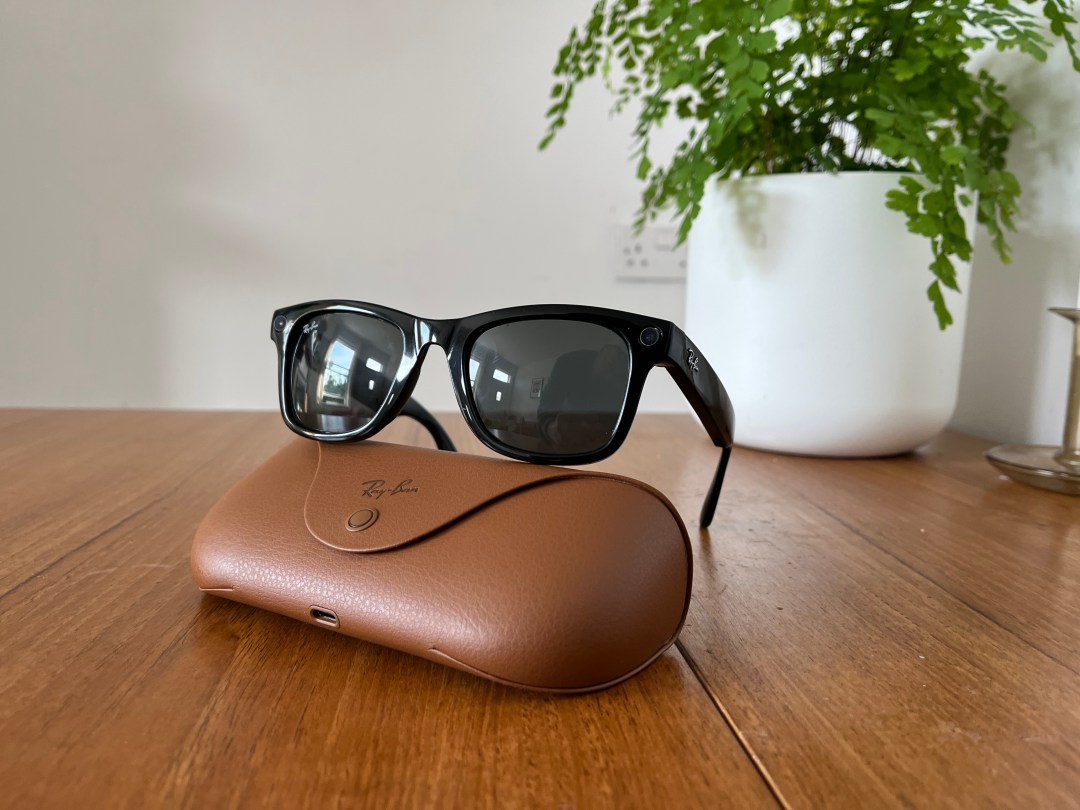Ray-Ban Meta Smart Glasses review: user-friendly privacy nightmare
Spy glasses are no longer reserved for the likes of James Bond or episodes of Black Mirror.

Stuff Verdict
Verdict…the Ray-Ban Meta Smart Glasses are a user-friendly set of specs, but are limited by a basic camera and too few features.
Pros
- Stylish
- Could be useful for cyclists
Cons
- Undeniably creepy
- Lacklustre camera doesn’t cut it
Introduction
Spy glasses are no longer reserved for the likes of James Bond or episodes of Black Mirror. The newest launch from Ray-Ban and Meta, the Ray-Ban Meta Smart Glasses, brings us a pair of sunglasses with photo, video and audio capabilities. They’re a digital camera, wireless headphone and UV protector combined, but are they actually any good?
Before the Ray-Ban Meta Smart Glasses hit the shelves, we put the Ray-Ban Wayfarers 2.0 through its paces on an uncharacteristically sunny day in the UK.
How we test smart glasses
Every wearable device reviewed on Stuff is worn for as much as possible throughout the testing process. Cameras are tested using as mix of test scenes and real-world scenarios. We then use our own years of experience to judge general performance, battery life, and software ease of use. Manufacturers have no visibility on reviews before they appear online, and we never accept payment to feature products.
Find out more about how we test and rate products.
Design & build: cam couture

Meta isn’t quite known for it’s cutting-edge style. The Zuckerberg company doesn’t quite enjoy the same fanbase as Apple, which in itself is losing some of its popularity amongst the die hards. While Meta may be positioning itself as a VR leader, when it comes to fashion the company is quite happy to let others do the legwork.
In comes Ray-Ban, the luxury sunglasses company born in 1929. Ray-Ban’s have long been the sunglasses of choice for fashion conscious bikers and James Dean wannabes. One of their most popular lines, the Wayfarers, are as American as apple pie. And while these new specs may have evolved somewhat since Ray-Ban sunglasses first hit the shelves pre-World War 2, the basics are the same.
The Ray-Ban Meta Smart Glasses feel reliably high-end. I’m testing the Wayfarers, a timeless design made famous by the likes of Tom Cruise and Andy Warhol. I don’t quite pull them off in the same way that Hollywood movie stars do, but the thick frames and rounded curves will suit a range of face shapes.
The new glasses can be customised with over 150 different frame and lens combinations.
Camera: user-friendly, but limited







All of the camera functions are controlled by a little button on top of the right temple. A single press takes a photo, while holding the button will initiate video recording. You can also take a photo with a ‘Hey Meta, take a photo’ prompt. The glasses capture images with a 12MP camera and 1080p video up to 60 seconds. The glasses can also support livestreaming over Instagram and Facebook.
While it’s not going to rival the quality of an iPhone 15 or Pixel 8 Pro, image quality is impressive for a camera that’s embedded in a pair of sunglasses. In the right light, colours can be bright and bold.
But beyond that, the camera doesn’t quite hold up on its own. The glasses are susceptible to lens flare in sunny environments. Busy shots, such as crowd environments or wide landscapes, lack finer details. Using the glasses in both photo or video mode can often produce blurry results. That said, audio recording is well balanced and clear. There’s no great difference in volume between the wearer’s speech and a subject.
It’s also quite difficult to get the shot you really want. I often find a rogue foot or finger in my photos, even if I think my field of vision is clear. Beyond wearing the sunglasses, there’s no real time way to see what you’re snapping in real time. It’s possible to take a photograph, open your phone to take a look and retake if required. But that’s a lot of stages to take when a phone camera would be better.
Sound: Ray-von
Audio has been improved on past models. According to Meta, the speakers are 50% louder than the previous model, pumps out twice the amount of bass and audio bleed is reduced. It’s a fine feature, but is a little pointless. The glasses can’t compete with even the most budget buds or headphones. While leakage has been reduced, anyone within a few metres of you will still be able to hear your tinny tunes playing. Noise cancellation is pretty much non-existent, too.
The glasses perform far better when it comes to phone calls. Tapping twice on the right temple of the glasses will answer a phone call, while a tap and hold will cancel the call. It’s an easy to use and, more importantly, is a genuinely useful feature. Audio automatically connects and disconnects when taking the sunglasses on and off. This isn’t exactly new tech, but the glasses connect via Bluetooth without a hitch.
Usability: a privacy nightmare
You don’t need us to tell you how to wear a pair of sunglasses. Sure, an average pair isn’t controlled by a dedicated Meta View app, but the general premise is the same. You pop them on when it’s a little too bright, and away you go. Simple, right? Not quite.
It’s a difficult, almost impossible task to wear these glasses in any sort of social environment. It’s not down to the tech. Rather, it’s out of sheer self-awareness.
It’s never been socially acceptable to point a camera in someone’s face without their consent. YouTubers and Twitch streamers might argue different, and many others may agree with them. So personally, I don’t want to point a camera in someone’s face without their consent.
Every time I think of an opportunity to wear them, whether on a train, out shopping or in my local park, I’m overcome with a deep shudder in my bones. The whole experience seems invasive, and more than a little creepy. As I walk through the streets, I naturally avert my head downwards when passing someone on the street.
I could try them out with my friends, I thought. That was a mistake. Social norms and pleasantries may stop strangers telling me what they think about my new, nosey neighbour tech. My friends won’t, and I’m duly told to take them off (or words to that effect, littered with expletives). And I get it. I would be the same if faced with the same. I’d always be wondering whether people are actually engaging in conversation, or if they’re continuously looking for the perfect snap. It’s a distraction, and an unwanted one at that.
Ray-Ban Meta Smart Glasses verdict
The Ray-Ban Meta Smart Glasses may seem like secret agent tech, but it’s shortcomings far outweigh any cool factor it could have once possessed. The Ray-Ban name and design help iron out some of Meta’s shortcomings here, which is mainly a lacklustre camera with too many pitfalls. The glasses also posit a safety and privacy nightmare.
But if Meta gave us a vastly improved camera in the near future, would that change anything? I’m not so sure. Not every wheel needs to be reinvented, and new tech can sometimes cheapen an old classic. In this instance, the original Ray-Bans are still the best.
Stuff Says…
The Ray-Ban Meta Smart Glasses are a user-friendly set of specs, but are limited by a basic camera and too few features.
Pros
Stylish
Could be useful for cyclists
Cons
Undeniably creepy
Lacklustre camera doesn’t cut it
Expensive